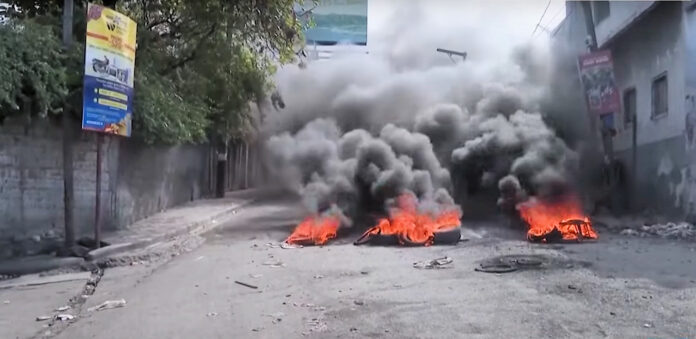
Despite three days of nationwide demonstrations, barricades, and street fighting, Haiti’s de facto Prime Minister Ariel Henry still clings to power after the Feb. 7 deadline on which opposition leaders, would-be revolutionaries, and Haiti’s masses had wanted him to step down.
Feb. 5 to 7 saw burning tire blockades throughout the capital Port-au-Prince, as the Haitian National Police (PNH) fired teargas at demonstrators who riposted with rock throwing.
On Feb. 8, the capital’s streets were practically deserted with the barricades’ charred remains littering dozens of arteries and intersections.
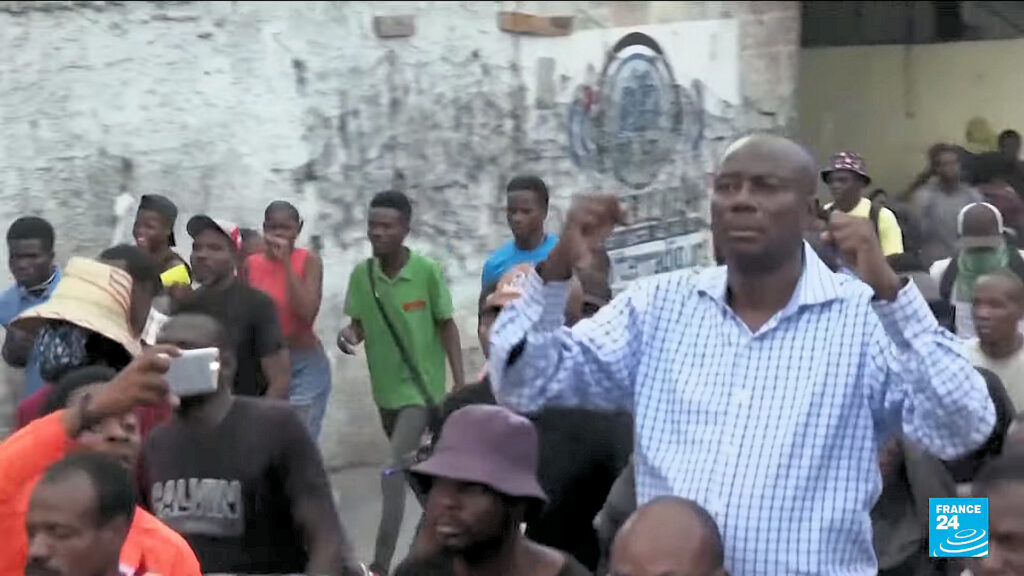
On Feb. 6, Guy Philippe, former 2004 coup d’état leader and 2017 Senator-elect for the South, finally appeared in Port-au-Prince after two months of exhorting Haitians to revolution from his rural base in the south through radio interviews and Youtube videos, as well as with truck-top speeches in several towns.
His long-awaited arrival in the capital was decidedly underwhelming, however, when he briefly popped up unannounced in Pétionville’s central St. Pierre Park and began shaking hands with surprised passers-by as a cameraperson clumsily recorded the event on a cellphone. Philippe just as quickly disappeared to a secret location, although Haitians began rushing from far and wide to the park, eventually provoking someone to fire at the massing crowd from the nearby Kinam luxury hotel.
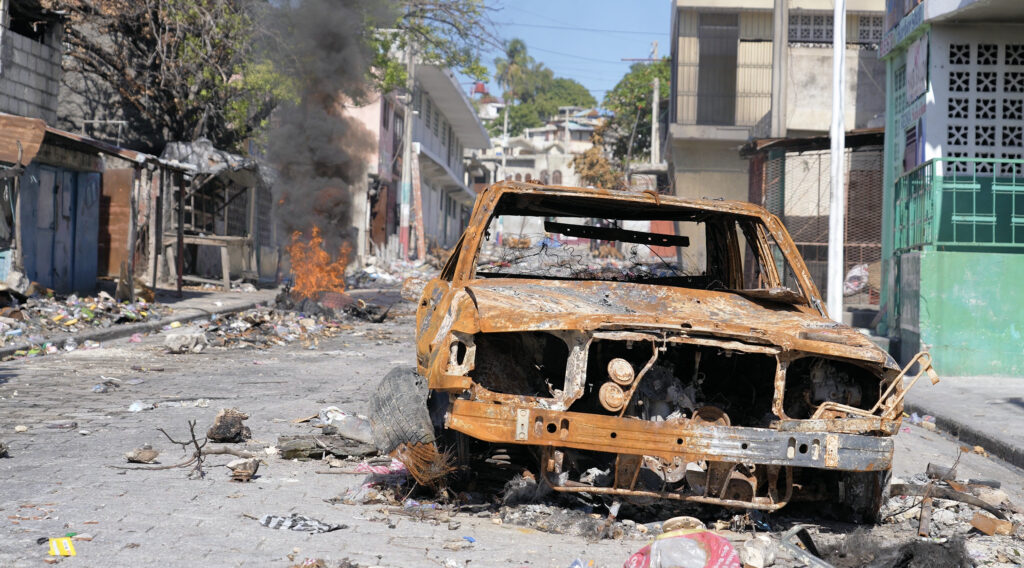
The same day, Philippe’s representatives announced an alliance with former Lavalas Sen. Moïse Jean-Charles, now the leader of the Dessalines Children (Pitit Desalin) party. (In 2004, the two leaders battled each other when Philippe’s troops passed though Jean-Charles’ northern hometown of Milot.) The “Heads Together to Save Haiti” alliance (Tèt Ansanm Pou Sove Ayiti) “aims to transcend the traditional political divides so as to use our efforts for progress and social and economic well-being” as well as “a firm and reasoned rupture with an inhuman, irresponsible, corrupt, gangsterized system.” Their eight points of unity include to “re-establish justice, law, and order” throughout Haiti, maintain “regular consultations,” and implement “a common program of governance.”
But if such an accord raised hopes of imminent success, they were dashed the next day – Feb. 7 – when the PNH ambushed a pick-up truck full of Surveillance Brigade for Protected Spaces (BSAP) agents, killing five of them (Zéphyrin Daniel, Mackendy Veillard, Dorvil Jean Fontange, Chrisner Désir, and Clersaint Thomas), while three were arrested and several others escaped. For two days, the cops had lain in wait with machine-guns at a gas station on the road running through Laboule (above Pétionville), apparently believing (erroneously) that Philippe would be in the vehicle. Although the PNH claimed its officers fired in response to the BSAP, an informed source confirmed what Philippe later angrily told a radio station: that the attack was unprovoked, with the BSAP totally blindsided and never drawing their rudimentary weapons (shotguns, pistols, and such).
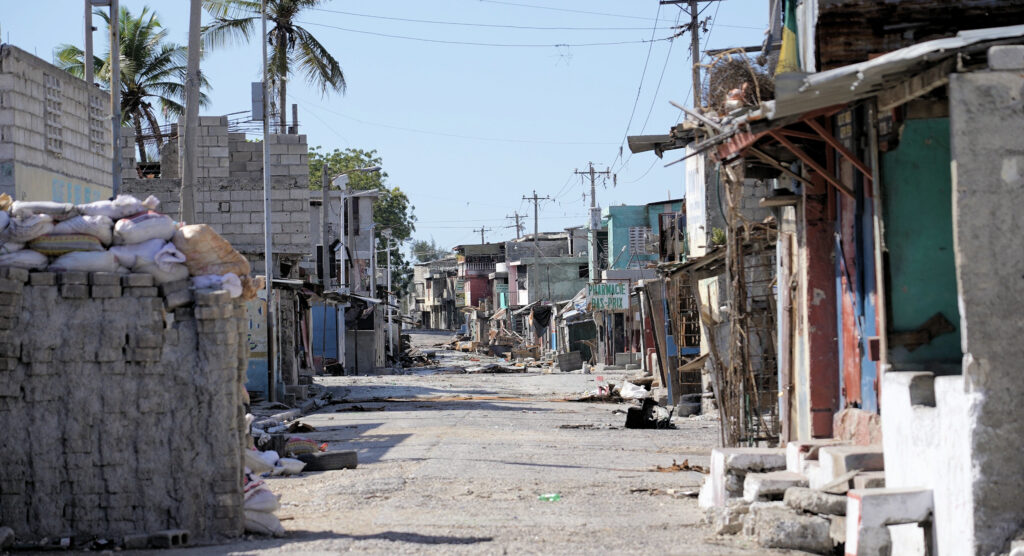
Most Haitians hope that BSAP, which has grown from a small contingent of armed park rangers formed in 2017 into a ragtag militia of many thousands today, will usher in the revolution to liberate Haiti from the widely decried “system.” BSAP is commanded by Jeantel Joseph, the head of Philippe’s National Consortium of Political Parties and director of the National Agency of Protected Areas (ANAP), whom Ariel unsuccessfully tried to fire late last month. To avoid assassination attempts, Joseph remains in the Central Plateau town of Hinche planning his next move. Although Ariel’s regime does not see Joseph or BSAP as legal, the BSAP maintains cordial relations with the PNH officers throughout most of Haiti except for greater Port-au-Prince.
The U.S. Chargé d’Affaires Eric Stromayer sprang to Ariel’s defense during the uprising, saying with typical paternalism on Radio Caraïbes: “It is necessary that all the political parties, civil society, and the business sector gather together with Ariel Henry to organize elections as soon as possible, to put an end to the Transition and the deplorable state in which the Haitian people find themselves.”
Despite such U.S. backing, Ariel is practically on the run, sleeping in different spots nightly, accompanied by a robust security detail of the General Security Unit of the National Palace (USGPN) and riding in a car with a “temporary registration” (IT) license plate rather than an “Official” one, for better camouflage.
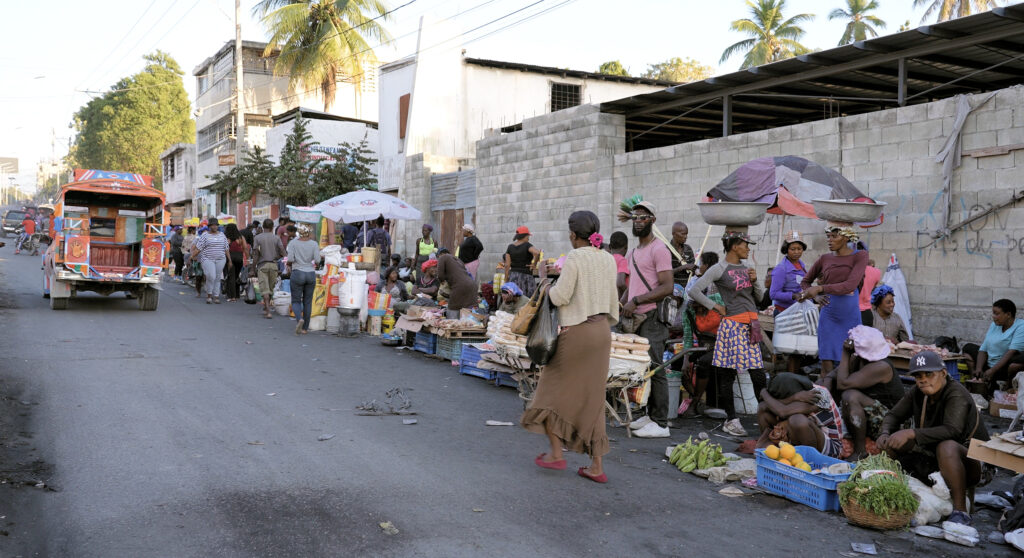
For example, late in the evening of Feb. 8, he and his itinerant security unit rented rooms in a distant corner of the hotel Le Plaza on the capital’s Champ de Mars central square. At breakfast the next morning, the cops surprised the only other guests in the hotel: a film crew dispatched by Haïti Liberté and Uncaptured Media. When the journalists learned that the PM was their neighbor, they scrambled to grab their gear and buttonhole Henry, but the security detail hustled him from the hotel before they could.
Such refuge would not have been possible in times gone by. The Champ de Mars plaza is traditionally the central site of Haiti’s Carnaval, which was from Feb. 11-13 this year. Normally Le Plaza would be filled with guests coming for the celebration, but this year, it was all but empty. The government built almost no stands, had few sound trucks (char), and the turnout was dismally tiny: a few hundred instead of the normal tens of thousands. On the second day of Carnaval, Feb. 12, authorities had to stop the parade because of heavy gunfire near the National Palace, sowing a wave of panic. Several people were reportedly wounded.
This paltry turn-out is not just due to hatred for Ariel’s regime but also to the resumption of kidnaping and violence by criminal gangs and the battles they are waging against the anti-crime armed coalition, the Revolutionary Forces of the G9 Family and Allies (FRG9), headed by former cop Jimmy “Barbecue” Cherizier.
Haiti’s disparate forces of revolution are racing the forces of foreign intervention to see which side will gain the upper hand
Following Cherizier’s failed attempt last September to negotiate a truce between all of the capital area’s armed groups, the FRG9 experienced several defections, betrayals, and killings. Now Cherizier’s lower Delmas quarters (Delmas 2, 4, 6) are in a bitter conflict with the new leaders of La Saline and Rue St. Martin, adjoining neighborhoods which used to be FRG9 affiliates.
“Ariel Henry is paying them to attack us as part of his effort to hold on to power,” Cherizier told Haïti Liberté, “and handicap our efforts to contribute to the nationwide uprising against his power and policies.” In other words, for the regime, the best defense is a good offense.
Despite the battle on lower Delmas’ western flank, Cherizier has been able to maintain a truce with the gangs of the Belair neighborhood to his south and east, headed by his long-time foe Kempès Sanon, a convicted kidnapper who escaped from jail in 2021.
Once the truce took effect last summer, Kempès stepped up murderous attacks on the historically neutral and gang-free neighborhoods of Solino and Fort National.
When asked about the attacks which resumed last month, Cherizier remains prudently neutral. “I can’t say anything for or against one side or the other,” he told Haïti Liberté and Uncaptured Media. “But we hope those two neighborhoods can work out their differences.”
The fighting with Rue St. Martin and La Saline has caused small merchants to flee the giant Croix des Bossales market, while Kempès’ raids on Solino – the most recent in mid-January – has caused similar small merchant flight from its giant Péan Market, which now stands deserted.
However, our team found the small merchants of Croix des Bossales and Péan Market now relocated on the Delmas Road between Delmas 10 and 12.
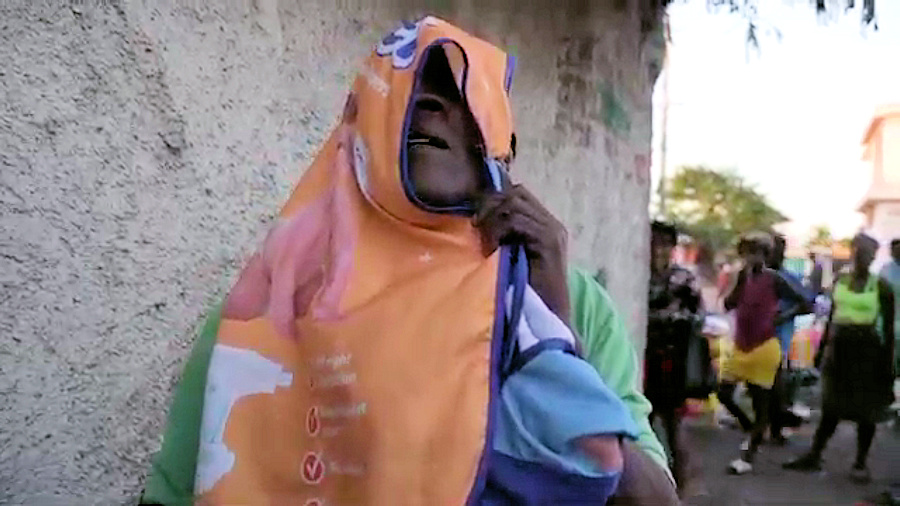
“I used to sell in the Péan Market,” said one merchant, who would not give his name and covered his face to be interviewed on camera. “But I had to leave there because Ariel Henry and his collaborators sent bandits to destroy everything there, and to destroy the country generally. Whatever happens to us, he never says anything. But he put the bandits.”
(Indeed, on Jan. 15, when Kempès resumed his latest attacks on Solino, a PNH unit stopped four vehicles with official plates entering his Belair neighborhood. Local residents say the cars carried money, arms, and ammunition for Kempès’ gang. A policeman and two other individuals in the vehicles were arrested.)
“We lost our merchandise and things in our homes when the gangs attacked,” the man in the Delmas 12 market continued. “The bandits chased us. Only here have we found a little relief. Even though some talk bad about Barbecue, Barbecue is a good guy, a good thing. He’s the one that gave us a little break and this market here. Barbecue is a good thing, and we don’t need Ariel.”
As the man spoke, nearby numerous small merchant women who had been reticent to speak on camera, broke out in dance, chanting: “Viv Bàbe,” a shortened form of “Long Live Barbecue.”
Indeed, actions speak louder than words.
Earlier that day, when touring Delmas 6 unaccompanied, our crew interviewed internally displaced women and men living in a tarp-roofed, unfinished community center. Its construction has been halted for four months due to the crisis.
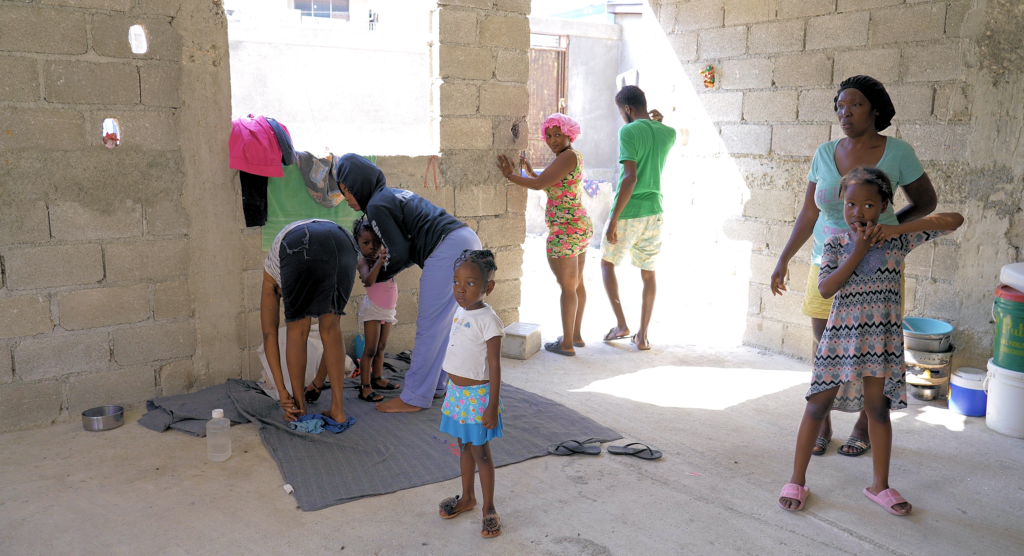
“We’re from Solino,” one woman told the journalists. “I left because bandits broke into my house. They didn’t set it on fire, but there was fire next door. I gathered all my things. All my merchandise was lost. I didn’t know where to go. But when we arrived here, Jimmy Cherizier took us in with open arms. He said we could stay here until we figure something out. He helps us, gives us food and water each day, and water to bathe with. We can’t go back to where we were because we could be killed. Many people have already died there.”
As of Feb. 11, Guy Philippe had returned to Jérémie. The same day, Justice Minister Emmelie Prophète and PNH chief Frantz Elbé traveled to Washington to discuss with officials from Kenya and the U.S. how to get the boots of 1,000 Kenyan police into Haiti as fast as possible, despite a Kenyan court’s order prohibiting the deployment.
Following the failure of the mobilization to oust Henry on Feb. 7, Haiti’s disparate forces of revolution are racing the forces of foreign intervention to see which side will gain the upper hand in what remains a stalemate as Haiti still smolders with anger, discontent, and desperation.
These are clearly just the opening stages of a longer, even rougher period of struggle ahead.









